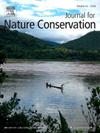从海洋到屏幕:德国在线海洋观赏鱼贸易中的数据缺口、保护问题和可持续性挑战
IF 2.5
3区 环境科学与生态学
Q2 BIODIVERSITY CONSERVATION
引用次数: 0
摘要
传统的宠物商店已经转移到网上,以获得更广泛的客户群,扩大了购买异国宠物的渠道,包括海洋观赏鱼。作为全球第三大海洋观赏鱼进口国,德国要求零售商遵守《德国动物福利法》,特别是在提供特定物种信息方面。尽管有这些规定,但对贸易的透明度、动物福利和整体可持续性的担忧仍然存在。为了调查这些问题,我们使用网络抓取工具收集了德国八家主要在线水族商店的数据,分析了海洋观赏鱼的物种多样性和贸易量,以及这些零售商提供的法律要求的特定物种信息。分析结果显示,共有59科767种观赏鱼,其中圈养观赏鱼仅占12%,大部分(88%)来源不明。价格从8.90欧元到4899欧元不等,人工饲养的产品平均比未知来源的产品贵29.3%。此外,我们的研究显示,全球受威胁的鱼类(13种)在德国水族馆被公开出售,这可能会损害它们的野生种群。尽管有法律义务,但大多数零售商只提供很少或根本不提供特定物种的信息,缺乏有关护理、保护状况或贸易文件的关键细节。我们强调迫切需要更严格地执行德国《海洋观赏鱼动物福利法》,并强调全面监测和研究海洋观赏鱼贸易的重要性,以及提高消费者意识,作为可持续国际贸易的重要工具,以及其他政策建议。本文章由计算机程序翻译,如有差异,请以英文原文为准。
From ocean to screen: Data gaps, conservation concerns, and sustainability challenges in Germany’s online marine ornamental fish trade
Traditional pet stores have moved online to reach a wider customer base, expanding access to exotic pets, including marine ornamental fish. Germany, the third-largest global importer of marine ornamental fish, mandates that retailers comply with the German Animal Welfare Act, particularly regarding the provision of species-specific information. Despite these regulations, concerns remain about the trade’s transparency, animal welfare, and overall sustainability. To investigate these concerns, we collected data from eight major German online aquarium shops using web scraping tools to analyze species diversity and trade volumes of marine ornamental fish sold, as well as the legally required species-specific information provided by those retailers. Our analysis revealed that 767 species from 59 families were available, with only 12% of the 2,467 ornamental fish products declared as captive-bred, while the majority (88%) were from unknown-source. Prices ranged from 8.90€ to 4,899.00€, with captive-bred products being, on average, 29.3% more expensive than from unknown-source. Additionally, our study revealed that globally threatened fish species (13 spp.), are openly sold in the German aquarium industry, potentially harming their wild populations. Despite legal obligations, most retailers provided minimal or no species-specific information, lacking key details on care, conservation status, or trade documentation. We underscore the urgent need for stricter enforcement of the German Animal Welfare Act for marine ornamental fish, and highlight the importance of comprehensive monitoring and research into the marine ornamental fish trade, along with increased consumer awareness, as crucial tools for sustainable international trade, among other policy recommendations.
求助全文
通过发布文献求助,成功后即可免费获取论文全文。
去求助
来源期刊

Journal for Nature Conservation
环境科学-生态学
CiteScore
3.70
自引率
5.00%
发文量
151
审稿时长
7.9 weeks
期刊介绍:
The Journal for Nature Conservation addresses concepts, methods and techniques for nature conservation. This international and interdisciplinary journal encourages collaboration between scientists and practitioners, including the integration of biodiversity issues with social and economic concepts. Therefore, conceptual, technical and methodological papers, as well as reviews, research papers, and short communications are welcomed from a wide range of disciplines, including theoretical ecology, landscape ecology, restoration ecology, ecological modelling, and others, provided that there is a clear connection and immediate relevance to nature conservation.
Manuscripts without any immediate conservation context, such as inventories, distribution modelling, genetic studies, animal behaviour, plant physiology, will not be considered for this journal; though such data may be useful for conservationists and managers in the future, this is outside of the current scope of the journal.
 求助内容:
求助内容: 应助结果提醒方式:
应助结果提醒方式:


